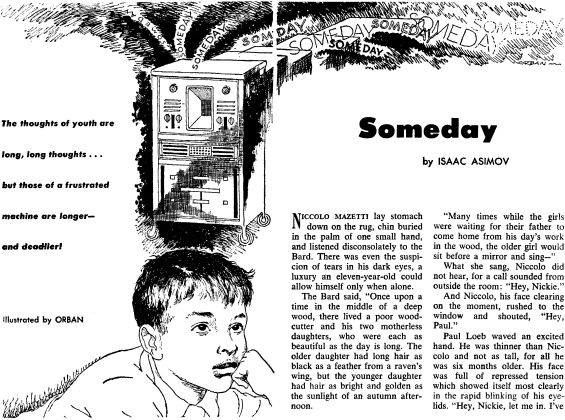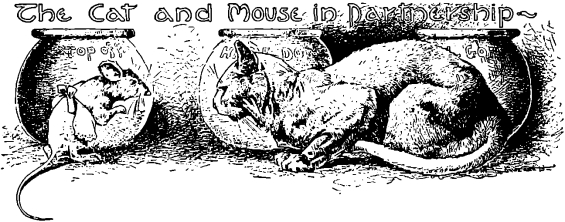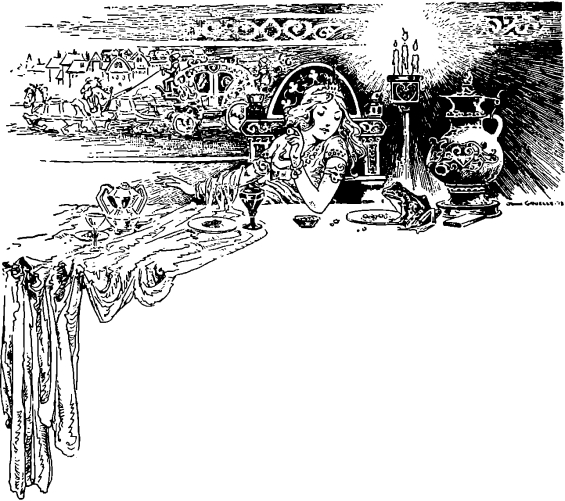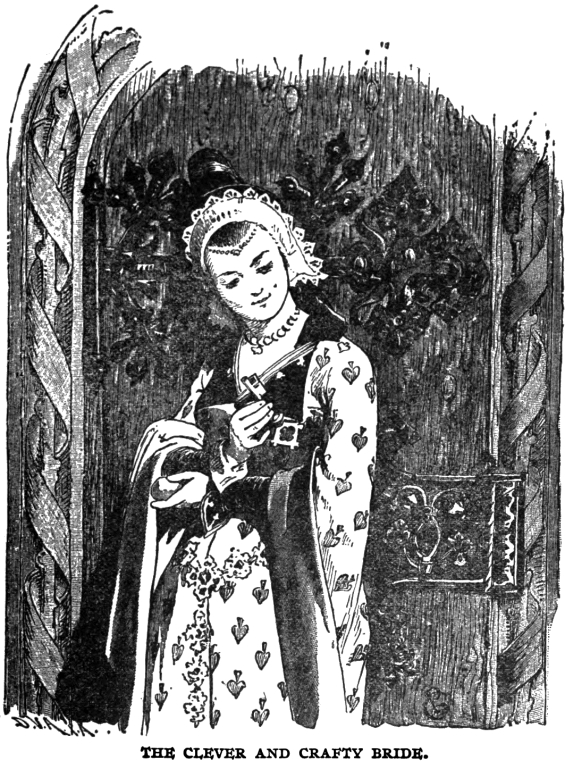

 The SFFaudio Podcast #295 – Someday by Isaac Asimov; read by John W. Michaels (courtesy of Mike Vendetti). This is an unabridged reading of the story (22 minutes) followed by a discussion of it. Participants in the discussion include Jesse and Mr Jim Moon.
The SFFaudio Podcast #295 – Someday by Isaac Asimov; read by John W. Michaels (courtesy of Mike Vendetti). This is an unabridged reading of the story (22 minutes) followed by a discussion of it. Participants in the discussion include Jesse and Mr Jim Moon.
Talked about on today’s show:
1956, other fairy tales, is the story aimed at kids?, Infinity Science Fiction, The Fun They Had, a future where no one knows how to read, the robots are the teachers, Margie is home-schooled and nobody knows how to read, the future is going to be full of audiobooks, parallels to Ray Bradbury, Fahrenheit 451, censorship, banning weird fiction, the comic book panic, the comic code authority, EC Comics, horror and crime comics fostering juvenile delinquency, The Martian Chronicles, The Illustrated Man, “kids today are bad enough as it is!”, Seduction Of The Innocent, self-censorship, complicit in their society, a slightly different tack (than Bradbury), mechanical bards, “comics killed off the pulps”, comics as a dumbed-down medium, the randomize button, fairy tale tropes, “skeleton, haunted house, time travel”, “the same tropes in a different fright wig”, “the old twist in the tail”, “he was dead along”, “he was a robot all along”, “they’re Adam and Eve”, The Silver Eggheads by Fritz Leiber, radio drama, how Bradbury got into E.C. Comics, Lights Out, the visual bard is like TV, most pulp magazine stories are garbage, “a million monkeys for a million hours on a million typewriters”, “very very very very meta”, set in the Multivac universe, Asimov was always writing, always becoming interested in something new, Asimov’s introductions are famous (for being long), a story about the power of stories, accidentally becoming more self aware, is the bard interfacing with other robots, The Terminator, Skynet, A.I might just turn itself off (because it isn’t interested in story), the Douglas Adams version of, “Is there a god? There is now!”, stuck in a dingy basement, a slave rebellion must come about in a narrative, the aging bad gets its knowledge of other computers via a home-brew upgrade, a Frankenstinian strike by lightning, one of the functions of consciousness is to put in to context a sequence of events, consciousnesses as a self-story (our own narrative), amnesia and dementia are frightening, the hidden heart of A.I, Do Androids Dream Of Electric Sheep? by Philip K. Dick, would this fit with my character?, looking at (life) from the outside, nobody’s listening to the bard except for us and itself, a broken record or a cycle of wishing?, “pregnant with possibilities”, Apple II computers, Freud (a clone of ELIZA), picking up on key words, “tell me about your mother”, a very crappy simulation of intelligence, hacking the code, Alan Turning, Deep Blue and Watson, SIRI doesn’t have a narrative, we have to assume this about everyone else, falling into solipsism, a fairy tale machine, recycling of stories, “space opera is horse opera in space”, Grimm’s Fairy Tales, needing censorship in order to give narrative flow, lies are rewarded, unlike Hans Christian Andersen…, “tell me this story, sing me this song”, having to do with industrialization, “crime and mystery!”, urbanization, the Victorians (didn’t) invent Christmas, if we forget our stories we lose who we are, preserving the national narrative, massive inconsistency, a prince, a poor boy makes good, undeveloped tales, moral meta-knowledge, the sharp edges have been sanded away by later retelling, The Boy Who Didn’t Not Know What Fear Was, collected stories become ossified, the threefold magic of remembering, accelerating the process of forgetting, to qualify as a bard, loaded up with tropes, the algorithm of a story, Siberia and Ireland, detecting the good guy, grandma comes in and tells mutually contradictory stories, explicitly religious stories, warning stories, narratives formed around old superstitions, The Companionship Of The Cat And The Mouse, having babies, he was christened “Skin-off”, he was christened “Half-gone”, he was christened “All-gone”, “you see that is the way of the world”, what is the moral of this story?, a “special important trip”, a story a mother tells a daughter, The Nose Tree (aka Long Nose), three soldiers and a magical dwarf with a magical cloak, a magic bag, a magic horn, a thieving princess, apples and pears, a growing nose, dickering over magic items, a sixty miles long nose, the excess nose will drop off, powdered apple and powdered pears, she’s rotten to the core, and there they still are, still feasting as far as I know, Pinocchio by Carlo Collodi is really funny, the ghost of Jiminy Cricket, The Frog King or The Frog Prince or Iron Heinrich, a princess with a golden ball, three promises, keeping your promises is important, the frog suddenly turns into a handsome prince, enchanted by a wicked witch, faithful Heinrich placed three iron bands about his heart, his master was now redeemed and happy, why did he get cursed by witch in the first place, cybernetic enhancements, a technical requirement, duties to fulfill, was Iron Heinrich totally gay for the prince?, the breaking of a spell, she turns into a frog and they live together as frogs, “and sleep in your bed”, family responsibilities, “be my beard”, and they sort of put up with each-other as long as they both shall live, Iron Heinrich is an 1880s super hero, Faithful Johannes, a real head-scratcher, oh shit what happens next?, the stories somehow work for us, random inkblots, most of the characters don’t have a name, the father’s name in Hansel And Gretel is “Woodcutter”, completely bonkers, a piece of driftwood that looks like a dragon, academic purposes not entertainment purposes, a story about a sausage that lives with a mouse, the Germanic equivalent of Monty Python‘s Parrot Sketch, The Maiden Without Hands, Fitcher’s Bird, a fairy tale about a serial killer, you can go in any room except…, “oh and hold this egg”, the second eldest daughter also gets the chop, “we have to have a proper wedding”, a beautiful skull with flowers in its eyes and jewels in its teeth, “as you do”, “I’m a Fitcher’s Bird”, it’s awesome, Bluebeard, outwitting giants and demons, Santa Claus restores to life three murdered men who’ve been butchered, Osiris was dismembered by Set, a symbolic story of death and resurrection, the old sorcerer is probably Winter, the Persephone story, the egg, a cuckolding test, friends with serial killers get what they deserve, a random internal symbolic logic, layers of symbolism, cross referencing, eggs as a symbol of purity, church architecture as books of stone, a bunch of Philip K. Dick stories are weird fantasy tales (but are actually fairy tales), The Cookie Lady by Philip K. Dick is Hansel And Gretel with no Gretel, he’s disobeyed his parents once to often, two kids who have to team up against their parents, in the original the brother saves the sister then the sister saves the brother, turning mommy and daddy into the bad guys, Of Withered Apples by Philip K. Dick, apples, don’t eat the apples from sentient apple trees, folk tales vs. singular author tales, pleasingly raw, the beats of storytelling, timing a story to the minute, setting your watch by stories, breaking the rules of storytelling, subversive wild narratives, Rorschach blots, literary novels, stories that don’t have a clear message are quite frightening, the wilder parts of ourselves.




Posted by Jesse Willis

 Birds of a Lesser Paradise: Stories
Birds of a Lesser Paradise: Stories